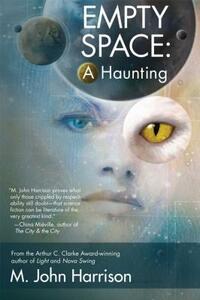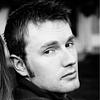Take a photo of a barcode or cover
Glorious ending to the Kefahuchi Tract trilogy. I've never read better literature on the unknownness of the universe and of the human being.
How I'll love to write the review of the entire trilogy for Galileo!
How I'll love to write the review of the entire trilogy for Galileo!
I was very dismissive of Nova Swing on the most recent episode of the Writer and the Critic podcast and unfairly so. Now having read Empty Space I see both Nova Swing and Light in a different… er… light.
Empty Space isn’t a book about answering questions or startling revelations, although there’s a little bit of that. Rather it clarifies Harrison’s intent - his deconstruction of traditional SF and his undermining of expectations. And he does all this with the sort of slippery but gorgeous writing that makes you reread sentences more than once.
Reading Empty Space is not easy. The book, like an impatient toddler (tautology?) is constantly writhing around, doing precisely the sort of things you’re not expecting it do and making a point of not answering the questions you’re sure it’s about to answer. And somehow Harrison pulls this off without it ever feeling annoying or pretentious or trite.
Ok the book is full of vomiting (most of the main characters have a chuck at least once) and I still don’t get the scene with Brian Tate and the masturbating threesome (I mean seriously WTF!) but I found the experience of reading this sometimes bizarre, sometimes elegiac, sometimes frustrating but always smart novel to be a genuinely exciting experience.
So in-spite of my reservations when Kirstyn and I discussed Light on episode 30 of Writer and The Critic, I think the series as a whole is a success.
Empty Space isn’t a book about answering questions or startling revelations, although there’s a little bit of that. Rather it clarifies Harrison’s intent - his deconstruction of traditional SF and his undermining of expectations. And he does all this with the sort of slippery but gorgeous writing that makes you reread sentences more than once.
Reading Empty Space is not easy. The book, like an impatient toddler (tautology?) is constantly writhing around, doing precisely the sort of things you’re not expecting it do and making a point of not answering the questions you’re sure it’s about to answer. And somehow Harrison pulls this off without it ever feeling annoying or pretentious or trite.
Ok the book is full of vomiting (most of the main characters have a chuck at least once) and I still don’t get the scene with Brian Tate and the masturbating threesome (I mean seriously WTF!) but I found the experience of reading this sometimes bizarre, sometimes elegiac, sometimes frustrating but always smart novel to be a genuinely exciting experience.
So in-spite of my reservations when Kirstyn and I discussed Light on episode 30 of Writer and The Critic, I think the series as a whole is a success.
4.5 stars
There's a ton of prose in this series that really often makes me think Harrison is one of the best prose writers alive. It's not most readers' usual cup of tea, perhaps, but the language is just so well done, so consistently. It's got a subtle fluctuation between genre(s) and style(s) that it feels like a multilayered effort by multiple authors. So many things work incredibly well in these 3 books (Light, Nova Swing, and Empty Space) that almost certainly shouldn't — or rather, likely wouldn't in a lesser author's hands. There is some serious mastery of craft taking place here between these covers; it's a true joy to watch it all unfold. Sublime. I love and adore Harrison's work (A LOT*)!!
There's a ton of prose in this series that really often makes me think Harrison is one of the best prose writers alive. It's not most readers' usual cup of tea, perhaps, but the language is just so well done, so consistently. It's got a subtle fluctuation between genre(s) and style(s) that it feels like a multilayered effort by multiple authors. So many things work incredibly well in these 3 books (Light, Nova Swing, and Empty Space) that almost certainly shouldn't — or rather, likely wouldn't in a lesser author's hands. There is some serious mastery of craft taking place here between these covers; it's a true joy to watch it all unfold. Sublime. I love and adore Harrison's work (A LOT*)!!
challenging
dark
mysterious
sad
slow-paced
Plot or Character Driven:
Character
Strong character development:
Yes
Loveable characters:
Complicated
Diverse cast of characters:
Yes
At no point in this novel did I have any idea what was going on.
This third book is a sequel to both the first and second books. In the past it's either 2023 or 2024 and it follows the sole viewpoint of Anna, who was in the first book. In the future it's 2452 at the very earliest and follows the perspectives of the crew of the Nova Swing, the unnamed assistant, and a few others. Is there a present? It would seem that all time may be.
The opening screams "you're reading weird fiction!" and continues to do so for the remainder of the book. This is definitely the weirdest of the trilogy and I'd go as far as to say it's gratuitously so. I don't know if it was for the sake of shock value, grossness, perversion, transgression, or whatever else. I assume it was intended to be literary regardless. The question I asked myself the most by far was, "What purpose does its inclusion serve?" I wasn't able to find any answers to that.
The characters continued to be in the same fashion as the previous books and in some ways even more so. Two of the viewpoint characters don't have much of a self. Anna is entirely disordered which makes for similar reading and the unnamed is empty. All the other characters have some level of detachment, though its especially pronounced with the aforementioned. Its so weird that it makes for interesting reading at least.
When it comes to the plot, for Anna it's her daily life, which is peculiar due to her thought processes but otherwise relatively mundane. The unnamed continues to investigate stuff. The crew of the Nova Swing does runs from place to place. The others live their lives as they normally do. That's to say there isn't really a plot all that much. There's a galactic war going on in the background, but it's irrelevant except for its metaphorical value. What plot there is revolves around an ancient artifact that may have unknowable motives and unlimited power.
As for the graphic content, there's a lot of sexual activity, effluence, and children. There's so much sex, though most of it is casually mentioned in passing rather than being described in detail. Seemingly almost everything comes back to sex or genitalia. Emesis may be the second most common activity, as there's a steady flow of its discussion and occurrence throughout the book. In other words, vomit everywhere. There's also multiple scenes of urination and one of defecation. Children, both male and female, have several sexualized descriptions and engage in sexual activity. Again, it's brief moments not much described. There's no denying they're present though. Was all of this in service of profundity and literary excellence? Based on the reviews I looked through, many seem to think so, but that wasn't how I read it.
I'm very conflicted. It has so many problems but its also so fascinating. Reading it is an entrancing experience in both a pleasing and displeasing way. It's a very elegant sort of decadence. I don't know.
The opening screams "you're reading weird fiction!" and continues to do so for the remainder of the book. This is definitely the weirdest of the trilogy and I'd go as far as to say it's gratuitously so. I don't know if it was for the sake of shock value, grossness, perversion, transgression, or whatever else. I assume it was intended to be literary regardless. The question I asked myself the most by far was, "What purpose does its inclusion serve?" I wasn't able to find any answers to that.
The characters continued to be in the same fashion as the previous books and in some ways even more so. Two of the viewpoint characters don't have much of a self. Anna is entirely disordered which makes for similar reading and the unnamed is empty. All the other characters have some level of detachment, though its especially pronounced with the aforementioned. Its so weird that it makes for interesting reading at least.
When it comes to the plot, for Anna it's her daily life, which is peculiar due to her thought processes but otherwise relatively mundane. The unnamed continues to investigate stuff. The crew of the Nova Swing does runs from place to place. The others live their lives as they normally do. That's to say there isn't really a plot all that much. There's a galactic war going on in the background, but it's irrelevant except for its metaphorical value. What plot there is revolves around an ancient artifact that may have unknowable motives and unlimited power.
As for the graphic content, there's a lot of sexual activity, effluence, and children. There's so much sex, though most of it is casually mentioned in passing rather than being described in detail. Seemingly almost everything comes back to sex or genitalia. Emesis may be the second most common activity, as there's a steady flow of its discussion and occurrence throughout the book. In other words, vomit everywhere. There's also multiple scenes of urination and one of defecation. Children, both male and female, have several sexualized descriptions and engage in sexual activity. Again, it's brief moments not much described. There's no denying they're present though. Was all of this in service of profundity and literary excellence? Based on the reviews I looked through, many seem to think so, but that wasn't how I read it.
I'm very conflicted. It has so many problems but its also so fascinating. Reading it is an entrancing experience in both a pleasing and displeasing way. It's a very elegant sort of decadence. I don't know.
The first installment of the K tract series of novels, Light, was confusing but intriguing. The second book, Nova Swing, was full of cool ideas and read more like a traditional cyberpunk sort of affair. I found this last book, Empty Space, to be utterly confusing and just not comprehensible. I’ll admit to probably not being smart enough to “get it”. But it included lizard people, a long-lost explorer presumed dead emerging from the tract, unresponsive, dead, and/or murdered individuals floating incomprehensibly above the floor, some horse-trading involving the Nova Swing, two-foot long penises, seemingly gratuitous sex, and adult genitalia attached to childlike bodies exuding from the walls. And that’s just part of it. I just didn’t get it, but it wasn’t so boring or uninteresting as to keep me from reading on. So just average. And perhaps a reread at a later date.
dark
emotional
reflective
slow-paced
Plot or Character Driven:
A mix
Strong character development:
Yes
Loveable characters:
Complicated
When I first picked this book up, I assumed it was a sequel to Light, which came out in 2002. It's actually the third book in a trilogy, with book 2 being Nova Swing. I read Light ages ago, and hadn't read Nova Swing, so I found myself foundering through a good chunk of this book trying to figure out what was going on. Having read other reviews, it appears to be this way even for people who are more familiar with the preceding books.
The story flips between a few storylines. One set in the near present and the others set further in the future when great hulking ships run between planets. This is not an easily accessible book and the reader will find themselves with a bit of a struggle on their hands to grasp what is going on. After finishing, I'm still not entirely sure of all the plot details. There is a mother and daughter who have drifted apart. There is a ship doing recovery work. There are floating ghosts that can't communicate. Much of it is about being adrift and the empty space in our lives.
What I do know is that Mr. Harrison rights lovely prose that is descriptive and feels a little stream of consciousness at times. I kept reading because I found the writing to be outstanding. I let the words take me along and I'm glad I took the journey. Probably not for everyone, but it was a pleasant surprise for me.
The story flips between a few storylines. One set in the near present and the others set further in the future when great hulking ships run between planets. This is not an easily accessible book and the reader will find themselves with a bit of a struggle on their hands to grasp what is going on. After finishing, I'm still not entirely sure of all the plot details. There is a mother and daughter who have drifted apart. There is a ship doing recovery work. There are floating ghosts that can't communicate. Much of it is about being adrift and the empty space in our lives.
What I do know is that Mr. Harrison rights lovely prose that is descriptive and feels a little stream of consciousness at times. I kept reading because I found the writing to be outstanding. I let the words take me along and I'm glad I took the journey. Probably not for everyone, but it was a pleasant surprise for me.
The third in Harrison's science fiction trilogy, "Empty Space" is both more and less approachable than the other two. Less self-contained, the novel involves characters from both "Light" and "Nova Swing." Harrison's depiction of the future feels less outre than in previous outings, his stylistic nuance easier to engage with. Much like "Nova Swing", he introduces a wide array of characters whose stories intersect, impact, and bounce off each other in ways that reflect even less that magical beast called a "plot" and even more that far less comprehensible creature called "life."
Worthwhile for the fantastic imagery of the future, the dense complexity of its characters, and the strangely-fond-yet-not-uncritical portrait of Anna, "Empty Space" is a suitable end-cap to the trilogy, bringing closure to many threads, yet leaving other open and wandering in the space between worlds and between people.
Worthwhile for the fantastic imagery of the future, the dense complexity of its characters, and the strangely-fond-yet-not-uncritical portrait of Anna, "Empty Space" is a suitable end-cap to the trilogy, bringing closure to many threads, yet leaving other open and wandering in the space between worlds and between people.


